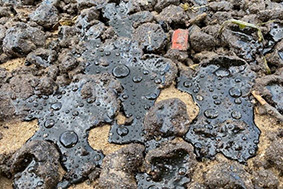Important Facts For Prelims
Tarballs
- 16 Sep 2021
- 2 min read
Why in News
Recently, black oil-emanating balls also called Tarballs were seen, lying on the shore of Mumbai Beach.
Key Points
- About:
- Tarballs are dark-coloured, sticky balls of oil that form when crude oil floats on the ocean surface. They are formed by weathering of crude oil in marine environments.
- Some of the balls are as big as a basketball while others are smaller globules. They are transported from the open sea to the shores by sea currents and waves.
- Most of the time, the presence of several tarballs indicate an oil spill. However, its annual occurrence on the west coast during the monsoon has led marine biologists and experts to demand an investigation in the matter.
- Oil-well blowouts, accidental and deliberate release of bilge and ballast water from ships, river runoff, discharges through municipal sewage and industrial effluents also leads to the formation of tarballs.
- Once tarballs hit the beaches, they may be picked up by hand or by beach-cleaning machinery.
- Concerns:
- Tarballs that travel towards the coast can get stuck to the fishing nets installed in the sea, making it difficult for fishermen to clean.
- In addition, it could affect marine life, especially filter feeders like clams and oysters.
- Tarballs are difficult to break down, and can therefore travel for hundreds of miles in the sea. Tarball pollution is a major concern to the global marine ecosystem.
- Food retrieved from the coastal waters including fish and other sea food might also get contaminated and become a part of the larger food chain harming the health of people.





